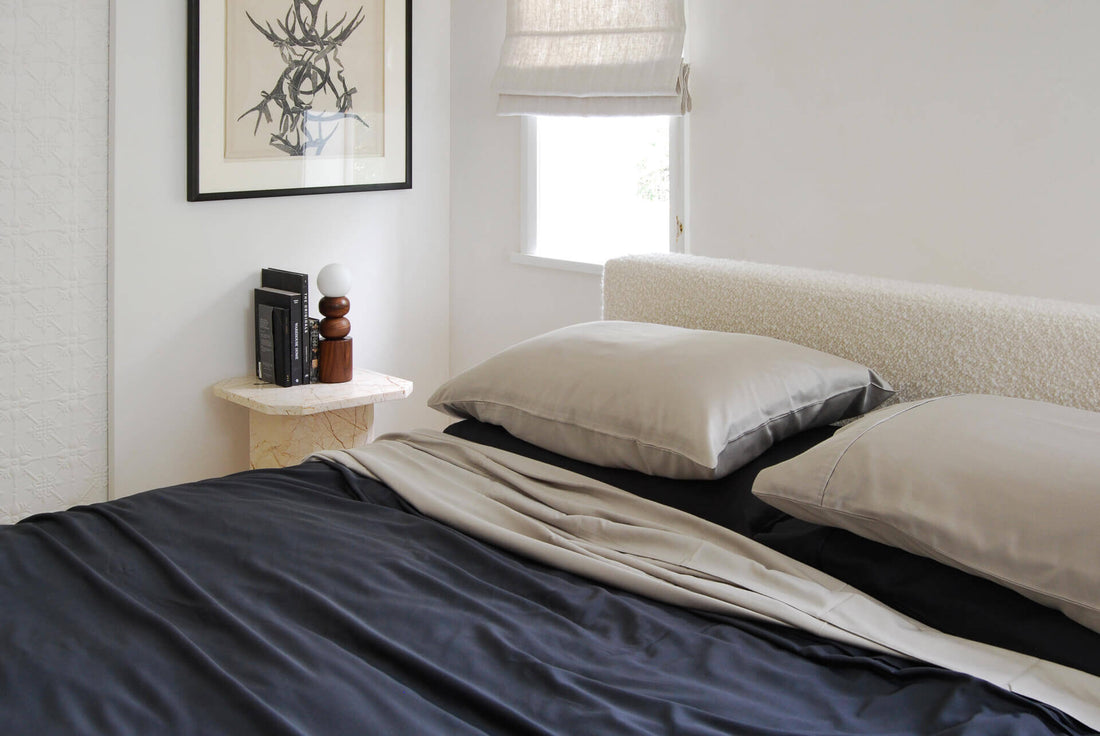A look at the myths of fabric labels
Clothing, bedding and towels carry many claims of certifications and sustainable practices.
Knowing where the textiles come from and what they contain is essential. Here, we delve into the topic to highlight the subtle, but significant, differences between organic and OEKO-TEX® fabric.
Why do fabric labels matter?
Australians believe in making sustainable choices. According to McKinsey & Company, as a nation we are focusing more on supporting local businesses, buying sustainable products, and being responsible with our money.
From the supermarket shelves to buying new bed sheets, we’re spending more time researching to make mindful decisions.
But even if you’re committing to more sustainable choices, the vast array of fabric labels used can lead to confusion: organic, OEKO-TEX®, sustainably sourced, GOTS… The two certifications you see most often, “organic” and “OEKO-TEX® 100” (or Standard 100 by OEKO-TEX®), are similar but not the same.
Let’s dive into the differences to help you unravel the mysteries of bedding and sustainable textiles.
What is Standard 100 by OEKO-TEX® certification?
Standard 100 by OEKO-TEX® fabric is safe for sensitive skin.
If you see Standard 100 by OEKO-TEX® on a product label, you can be confident it is independently tested and confirmed to be harmless to humans.
The certification ensures that every part of the product, from threads to buttons, zips, accessories and linings, pass the 100+ testing parameters under lab conditions.
The testing criteria are extensive and often stricter than national regulations. For example, the catalogue of prohibited ingredients includes potentially harmful chemicals that have not yet undergone government regulation.
Who provides OEKO-TEX® certification to companies?
OEKO-TEX®, often written as Oeko-Tex, is the registered trademark of the International Association for Research and Testing in the Field of Textile and Leather Ecology.
Testing happens at partner laboratories around the world. Once the product passes the tests, the manufacturer can apply to become a Standard 100 by OEKO-TEX® certified company.
Fast facts about OEKO-TEX® fabric certification
- Certification is voluntary and lasts 12 months
Textile producers are regularly audited and can apply to extend the certification. OEKO-TEX® certified companies pay licence fees to cover testing and auditing costs.
- It covers all processing steps
From the thread to the end product, every raw material, intermediate and end product, and all processing stages must meet strict OEKO-TEX® standards to pass.
- There are 100+ parameters
These include limits on harmful and potentially harmful chemicals, dyes, formaldehyde, nickel, plus testing for safety on sensitive skin.
- Testing accounts for how the fabric will be used
Textiles with more intensive skin contact, for example, bed sheets or fabrics for babies, are subject to stricter testing limits.
- Standard 100 by OEKO-TEX® is a global benchmark
Testing and certification are globally standardised. So wherever you see Standard 100 by OEKO-TEX® on fabric labels, you can be confident they passed the test.
- There are 4 product classes
From class 4 (home textiles) to class 1 (articles for babies and toddlers), the limits get stricter with more skin contact.
Is OEKO-TEX® organic?
Here is where things can get confusing. Standard 100 by OEKO-TEX® certified products can also be organic.
However, they are not one and the same.
Although OEKO-TEX® certification tests for a wide range of harmful chemicals, organic certification carries another set of criteria altogether.
Organic fabric certification
For bed sheets or clothes to be certified organic, the fibre used in the fabric must be grown under strict conditions relating to pesticides and synthetic fertiliser.
But that’s only if the product has organic certification.
In Australia, there is no requirement for a product to be certified organic to use the word “organic” on the label.
Companies can use words like “organic” and “biodynamic” without backing up their claims. The ACCC points out that there is a voluntary standard for companies wanting to use the claims, but they’re not actually required to meet the requirements.
Can a product be certified organic?
Yes, consumer products in Australia can earn organic certification. These certifications come from independent organisations similar to OEKO-TEX® and follow strict testing processes.
Australian Organic, the leading peak body for the organic industry, provides the most sought-after organic certification, ACOS. You may be familiar with the “bud” logo if you are among the Australians investing time into learning where your products come from.
To earn an Australian Certified Organic Standard (ACOS) stamp of approval, producers need to comply with a range of criteria outlined in the standard.
This includes creating an organic management plan covering things like:
- Pest management
- Soil fertility
- Environmental issues
- Contamination prevention
- Record keeping
- Traceability
- Biodiversity
Most of the information online refers to food production. But textiles can be certified organic as well.
Certified organic fabric
Textiles carrying a “certified organic” label are made from natural fibres like bamboo, hemp, wool or cotton grown according to ACOS standards.
In general, that means the plantation has been managed according to ACOS requirements for 3 years.
Spinning, dyeing and production also need to meet organic standards.
The most challenging part for most textile producers is dyeing. Because 100% plant-derived dyes are hard to come by, certifying bodies like ACO assess dyes on a case-by-case basis to ensure they meet consumer safety standards.
Is there an international organic certification for textiles?
Yes, just like OEKO-TEX® certification is recognised worldwide, textiles can earn GOTS certification.
The Global Organic Textile Standard sets out guidelines for the entire supply chain, just like ACOS and OEKO-TEX®.
Primary producers, processors, manufacturers and retailers can apply for GOTS certification. Although certification happens through approved third-party organisations, GOTS oversees the standards and certificates.
The criteria list is long, so you can trust GOTS-approved products meet strict requirements.
The difference between organic and OEKO-TEX® fabric
The main difference between organic and OEKO-TEX® fabrics is that organic fabric has not been tested for harmful substances.
Organic is a reassuring label. And organic certification from a peak body like ACOS should certainly convey the confidence that a producer follows ambitious practices.
But unless a product carries Standard 100 by OEKO-TEX® certification, there is no way to guarantee that it is 100% safe for humans.
When the product touches your skin, you should be confident that every thread, button, zipper, lining and accessory has been rigorously tested for safety. This is particularly important for babies and people with sensitive skin.
Should you buy organic OEKO-TEX® fabric?
Our ethos is to always choose the OEKO-TEX® certified product.
There are a few good reasons:
- Organic certification might only be part of the story
You need to read the labels very clearly to understand whether a product is end-to-end organic or only some ingredients/processes meet the standards.
- Standard 100 by OEKO-TEX® ensures your safety
Standard 100 is all about human safety. Especially for textiles like bed sheets, baby clothing, and fabrics in contact with sensitive skin, Standard 100 by OEKO-TEX® certifies a company’s commitment to your health and safety.
- Organic and biodynamic claims require no testing
Although times are changing (the ACCC is putting pressure on false organic labels), there is no legal requirement to prove a product meets its claims.
- Standard 100 by OEKO-TEX® is constantly evolving
OEKO-TEX® reviews its standards every 12 months. Similarly, OEKO-TEX® certified companies need to renew their certification every 12 months. So you can always trust that product inclusions, and manufacturing standards meet the most up-to-date best practices.
As we become more conscious of false claims and misleading organic labels, the pressure is on producers to back up their practices. And that can only mean good things for consumers.



